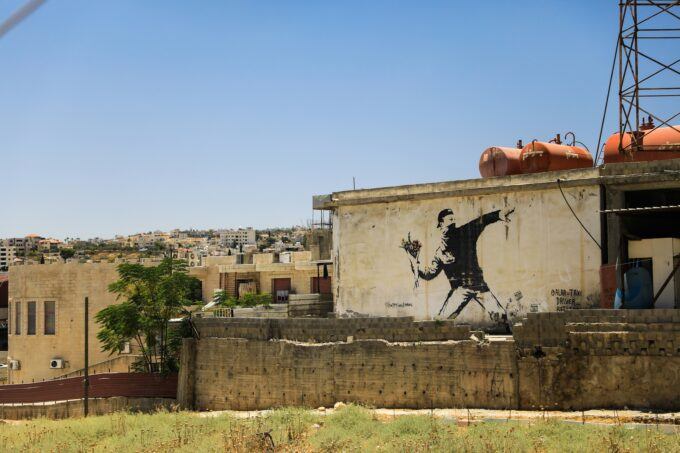Ramzy
Baroud
Israel
is aggressively implementing plans to shape Palestine’s future and the broader
region, sculpting its vision for the ‘day after’ its genocide in Gaza.

The
latest, bizarre iteration of this strategy proposes fragmenting the occupied
West Bank into so-called ’emirates,’ starting with the ’emirate of Hebron.’
This
unexpected twist in Israel’s protracted search for alternative Palestinian
leadership first surfaced in the staunchly pro-Israeli US newspaper, the Wall
Street Journal. It then quickly dominated all Israeli media.
The
report details a letter from a person identified by the WSJ as “the leader of
Hebron’s most influential clan.” Addressed to Nir Barakat, Jerusalem’s former
Israeli mayor, the letter from Sheikh Wadee’ al-Jaabari appeals for
“cooperation with Israel” in the name of “co-existence.”
This
“co-existence,” according to the “clan leader”, would materialize in the
“Emirate of Hebron.” This “emirate” would “recognize the State of Israel as the
nation state of the Jewish people,” in exchange for reciprocal recognition of
the “Emirate of Hebron as the Representative of the Arab residents in the
Hebron District.”
The
story may seem perplexing. This is because Palestinian discourse, regardless of
geography or political affiliation, has never entertained such an absurd
concept as united West Bank “emirates.”
Another
element of absurdity is that Palestinian national identity and pride in their
people’s unwavering resilience, especially in Gaza, are at an unprecedented
apex. To float such clan-based alternatives to legitimate Palestinian
leadership seems ill-conceived and is destined to fail.
Israel’s
desperation is palpable. In Gaza, it cannot defeat Hamas and other Palestinian
factions who have resisted the Israeli takeover of the Strip for 21 months. All
attempts to engineer an alternative Palestinian leadership there have utterly
collapsed.
This
failure has compelled Israel to arm and fund a criminal gang that operated
before October 7, 2023, in Gaza. This gang functions under the command of
Yasser Abu Shabab.
The
gang has been implicated in a litany of violent activities. These include
hijacking humanitarian aid to perpetuate famine in Gaza and orchestrating
violence associated with aid distribution, among other egregious crimes.
Like
the clan leader of Hebron, the Abu Shabab criminal gang possesses no legitimacy
and no public support among Palestinians. But why would Israel resort to such
disreputable figures when the Palestinian Authority (PA), already engaged in
“security coordination” with Israel in the West Bank, is ostensibly willing to
comply?
The
answer lies in the current Israeli extremist government’s adamant refusal to
acknowledge Palestinians as a nation. Thus, even a collaborating Palestinian
nationalist entity would be deemed problematic from an Israeli perspective.
While
Benjamin Netanyahu’s government is not the first Israeli leadership to explore
clan-based alternatives among Palestinians, the Israeli prime minister and his
extremist allies are exceptionally determined to dismantle any Palestinian
claim to nationhood. This was explicitly stated by extremist Finance Minister
Bezalel Smotrich. He famously declared in Paris, in March 2023, that a
Palestinian nation is an “invention.”
Thus,
despite the PA’s willingness to cooperate with Israel in controlling Gaza,
Israel remains apprehensive. Empowering the PA as a nationalist model
fundamentally contravenes Israel’s overarching objectives of denying the
Palestinian people their very claim to nationhood and, consequently, statehood
and sovereignty.
Though
Israel has consistently failed to establish and sustain its own alternative
Palestinian leadership, its repeated efforts have invariably proven disruptive
and violent.
Prior
to the Nakba of 1948, the Zionist movement, alongside British authorities
colonizing Palestine, heavily invested in undermining the Arab Higher
Committee, a nationalist body comprising several political parties. They
achieved this by empowering collaborating clans, hoping to dilute the
Palestinian nationalist movement.
When
Israel occupied the remainder of historic Palestine in 1967, it reverted to the
same divide-and-conquer tactics. For instance, it established a Palestinian
police force directly commanded by Israeli military administrations, in
addition to creating an underground network of collaborators.
Following
the overwhelming victory of nationalist candidates in the 1976 elections in
occupied Palestine, Israel responded by cracking down on PLO-affiliated
politicians, arresting, deporting and assassinating some.
Two
years later, in 1978, it launched its ‘Village Leagues’ project. It hand-picked
compliant traditional figures, designating them as the legitimate
representatives of Palestinians.
These
individuals, armed, protected and financed by the Israeli occupation army, were
positioned to represent their respective clans in Hebron, Bethlehem, Ramallah,
Gaza and elsewhere.
Palestinians
immediately denounced them as collaborators. They were widely boycotted and
socially ostracized.
Eventually,
it became evident that Israel had no alternative but to engage directly with
the PLO. This culminated in the Oslo Accords in 1993 and the subsequent
formation of the PA.
The
fundamental problem, however, persisted: the PA’s insistence on a Palestinian
state remains anathema to an Israel that has shifted dramatically to the right.
This
explains Netanyahu’s government’s unwavering insistence that the PA has no role
in Gaza in any ‘day after’ scenario. While the PA could serve Israel’s interest
in containing the rebellious Strip, such a triumph would inevitably recenter
the discussion of a Palestinian state—a concept repugnant to most Israelis.
There
is no doubt that neither the Abu Shabab gang nor the Hebron emirate will govern
Palestinians, either in Gaza or the West Bank. Israel’s insistence on
fabricating these alternatives, however, underscores its historic determination
to deny Palestinians any sense of nationhood.
Israel’s
persistent fantasies of control invariably fail. Despite their profound wounds,
Palestinians are more unified than ever, their collective identity and
nationhood hardened by relentless resistance and countless sacrifices.

No comments:
Post a Comment